Affiliate links on Android Authority may earn us a commission. Learn more.
Samsung Galaxy Note 8 vs Essential Phone
Published onAugust 23, 2017
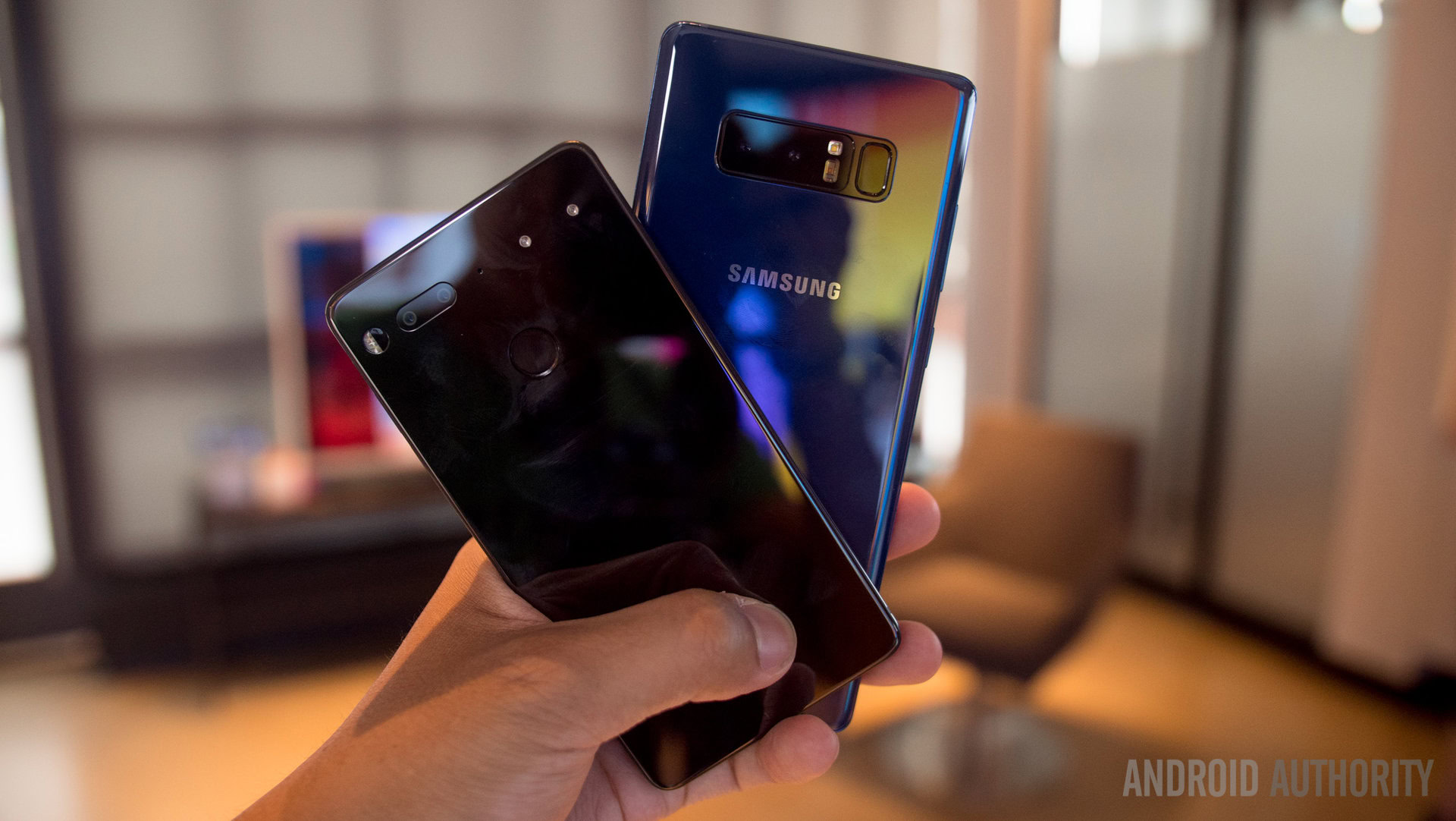
It’s coming up to the final stretch of the year and some of the biggest releases are coming to light, including the latest from Samsung with its new entry into the high-end smartphone market. In one corner, we have a phone that tries to do everything all in one package, while in the other we have a phone that tries to offer the fundamentals while redefining what a smartphone user really requires.
What happens when these two polar opposites come together? Let’s find out in this quick look at the brand new Samsung Galaxy Note 8 vs the Essential Phone.
- Samsung Galaxy Note 8 hands-on: bigger and better where it truly counts
- Samsung Galaxy Note 8 is here: can Samsung get the Note series back on track?
Just a couple years ago, you would be hard-pressed to find big-screened devices that were so artfully compact. The Galaxy Note 8 brings an AMOLED display that is about as large as the Galaxy S8 Plus‘ — over six inches with curved sides and nearly non-existent bezels. The screen comes with a ton of different features including Edge UX, where one can slide over a variety of different panels to access different functions. It is also the screen in this comparison that comes with an Always On Display feature. Because the Note 8 has an AMOLED panel, parts of the display can be used to display information and notifications even when the phone is asleep.
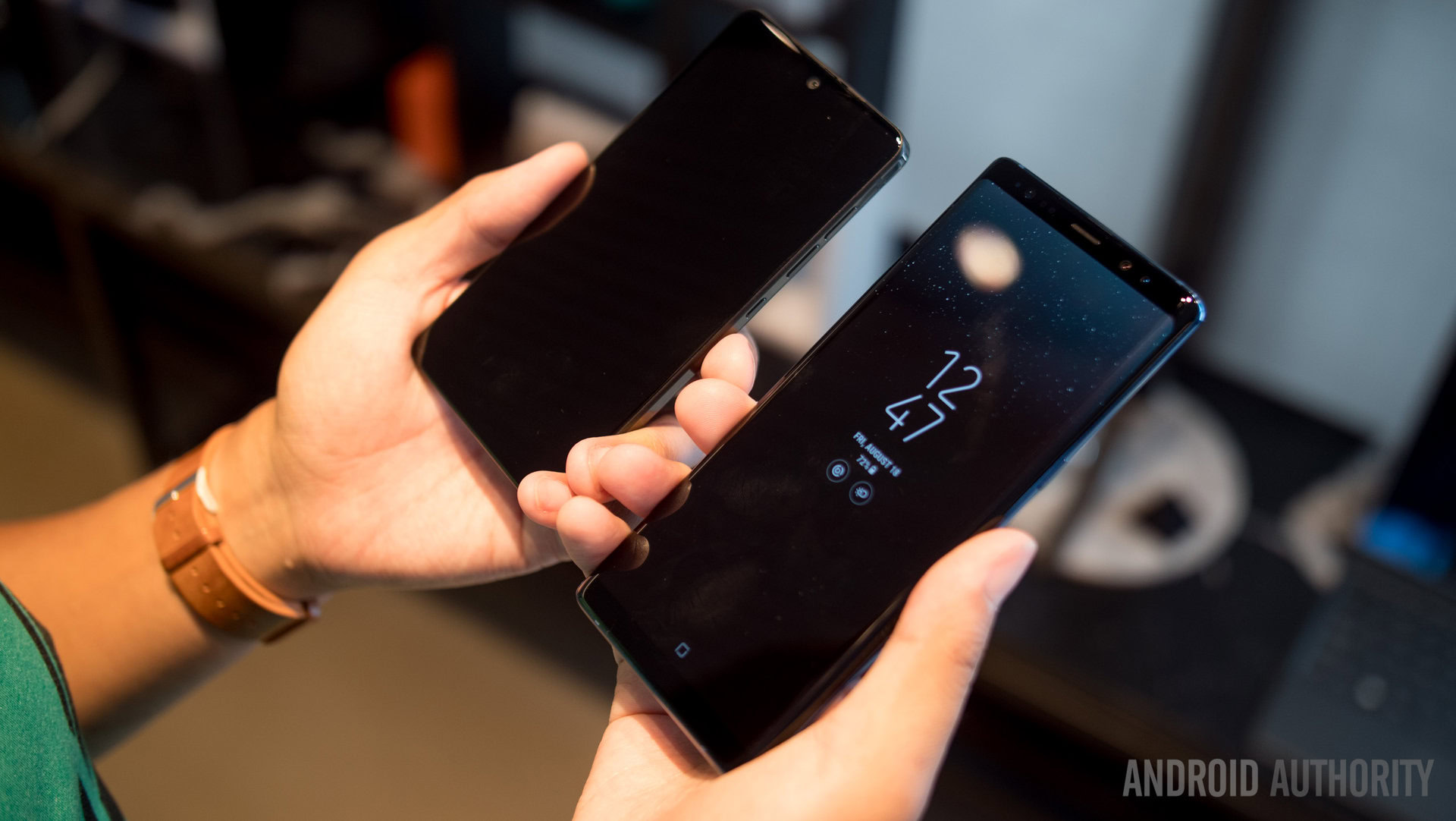
That isn’t the case with the Essential Phone, which sticks to Android’s default Ambient Display that pulses when notifications are received. It is also an IPS display at Quad HD resolution but has a 19:10 aspect ratio. The Essential’s display is 5.7 inches — a display size that used to define the Note series. Samsung has done well to really evolve their display technology, but with either of these devices it’s basically all screen all the time. The display gets a little cut off by the centered front-facing camera, as a small area dips down from the top and actually adds a break in the display. All elements stretch up to the very top, though, as much of the UI blends into this defining design feature.
The screens dictate the size of these phones, but it’s the Note 8 that manages to provide the better handling experience
The screens dictate the size of these phones, but it’s the Note 8 that manages to provide the better handling experience despite sporting a screen that was once considered tablet-sized. The blocky nature of the Essential Phone makes it the easier phone to use in one hand, but we also applaud the minimalist aesthetic approach. There’s no branding whatsoever on the Essential Phone, and, despite the dual camera, the phone’s connector pins help keep some symmetry.
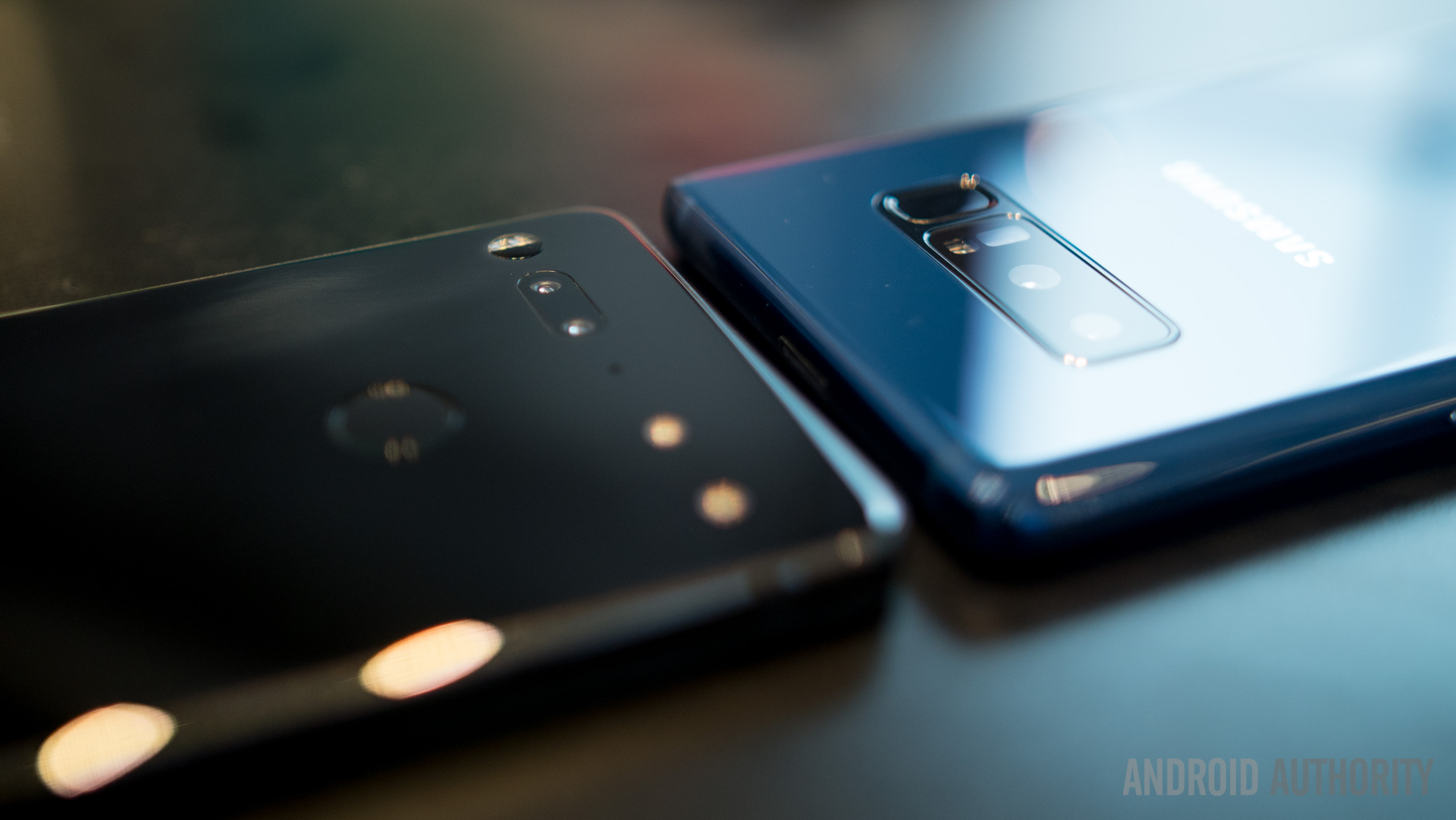
This is quite different from the Galaxy Note 8, whose new dual camera setup is placed in a black bar next to the fingerprint reader. The camera module on the back is black no matter which color you choose, which brings contrast to any non-black version of the device. The curved sides do help make the phone easier to maneuver in one hand, though this new Note is still a bit chunkier and a bit larger overall compared to last year’s model. Instead of the smooth slab of the Note 7, we now have a sleek, beefier piece of tech.
| Samsung Galaxy Note 8 | Essential Phone | |
|---|---|---|
Display | Samsung Galaxy Note 8 6.3-inch Quad HD+ Super AMOLED Infinity 2960 x 1440 resolution 521 ppi 18.5:9 aspect ratio | Essential Phone 5.71-inch LTPS LCD 2560 x 1312 resolution 503 ppi 19:10 aspect ratio |
Processor | Samsung Galaxy Note 8 Global: 64-bit octa-core (2.3 GHz Quad + 1.7 GHz Quad) Samsung Exynos 8895, 10 nm processor US: 64-bit octa-core (2.35 GHz Quad + 1.9 GHz Quad) Qualcomm Snapdragon 835, 10 nm processor | Essential Phone Octa-core (2.45 GHz Quad + 1.9 GHz Quad) 64-bit Qualcomm Snapdragon 835, 10 nm processor |
RAM | Samsung Galaxy Note 8 6 GB | Essential Phone 4 GB |
Storage | Samsung Galaxy Note 8 64/128/256 GB MicroSD expansion up to 256 GB | Essential Phone 128 GB No MicroSD expansion |
Cameras | Samsung Galaxy Note 8 Rear cameras - Main: 12 MP wide-angle AF Dual Pixel sensor with ƒ/1.7 aperture, OIS - 12 MP telephoto AF sensor with ƒ/2.4 aperture, OIS Front camera - 8 MP AF sensor with ƒ/1.7 aperture | Essential Phone Rear cameras - Dual 13 MP sensors (RGB + Mono), ƒ/1.85 aperture, Hybrid Auto Focus combing Contrast, Phase Detect and IR Laser Assist Focus Front camera - 8 MP sensor with ƒ/2.2 aperture |
Battery | Samsung Galaxy Note 8 3,300 mAh Non-removable Fast charging on wired and wireless WPC and PMA wireless charging | Essential Phone 3,040 mAh Non-removable Fast charging on wired No wireless charging |
Water resistance | Samsung Galaxy Note 8 IP68 dust and water resistance | Essential Phone Dust and water resistant |
Software | Samsung Galaxy Note 8 Android 7.1.1 Nougat | Essential Phone Android 7.1.1 Nougat |
Dimensions and weight | Samsung Galaxy Note 8 162.5 x 74.8 x 8.6 mm 195 g | Essential Phone 141.5 x 71.1 x 7.8 mm 185 g |
Audio is where the ‘Essential’ moniker might take a bit of a beating, however, as it lacks a headphone jack and requires a USB Type-C adapter
Under the hood, these devices are evenly matched on the processor front, with both featuring Qualcomm’s Snapdragon 835. Samsung has stepped its game up with 6 GB of RAM in all Note 8 variants, while Essential keeps the standard 4 GB of RAM but makes sure 128 GB of internal storage makes up for the lack of SD card expansion. Audio is where the ‘Essential’ moniker might take a bit of a beating, however, as it lacks a headphone jack and requires a USB Type-C adapter. This is not the case with the Galaxy Note 8, which many users will likely appreciate. And despite the larger 3,300 mAh battery of the Samsung phone, it is trying to power a larger display and a ton of other features. The 3,040 mAh unit in the Essential is likely to be proportionate for its 5.7 inch display, but we will see how both of these phones fare in their daily usage.
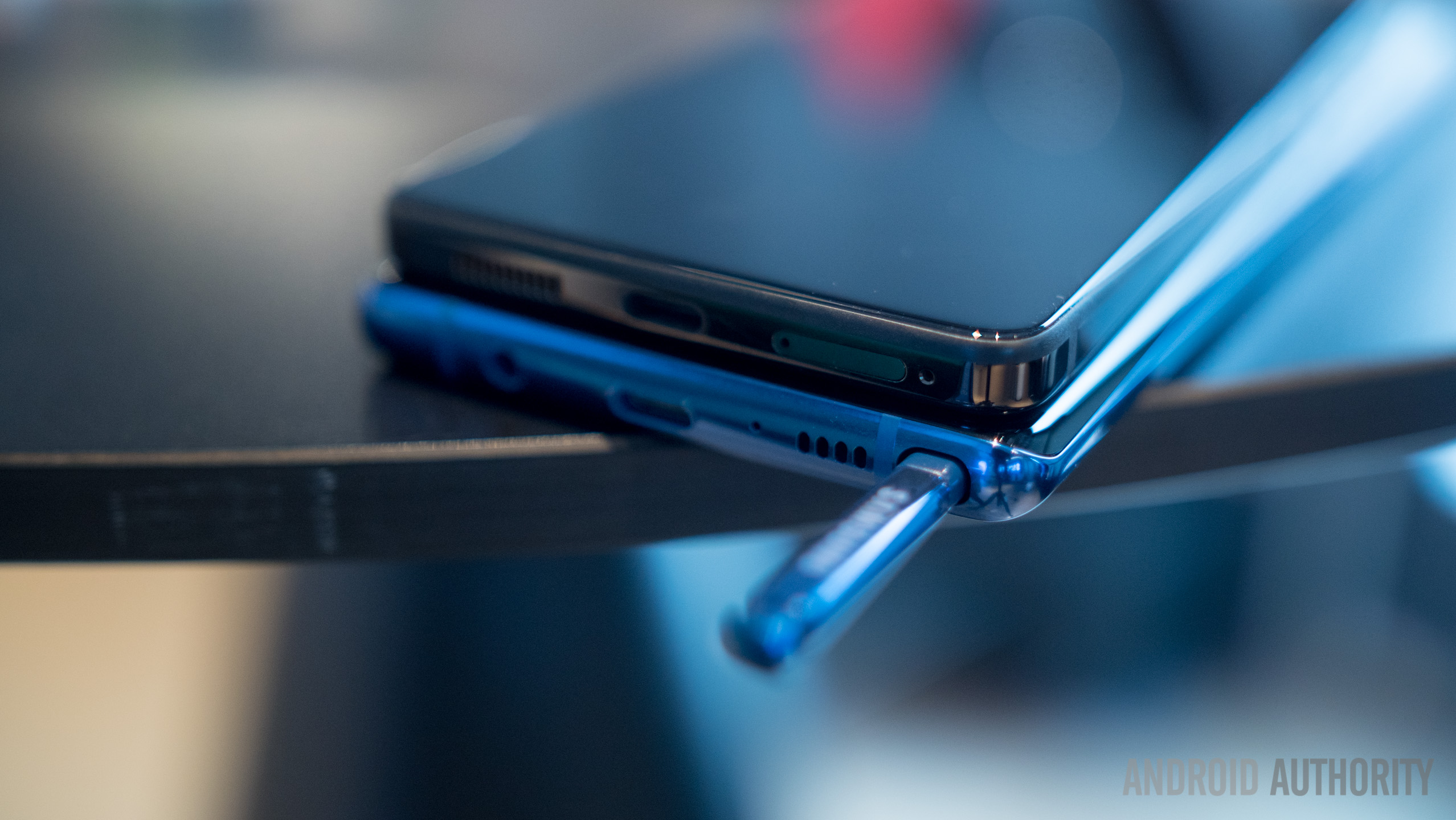
The S Pen continues to be one of the most well thought out companions to any smartphone
This brings us to the S Pen — the hardware addition that has always defined the Note lineup. The Essential Phone does not boast any such included accessory, and for people that really need productivity tools or even want a little extra fun, the S Pen continues to be one of the most well thought out companions to any smartphone. This year, the S Pen gains better an improved Screen Off Memo mode that lets you create and edit up to 100 total pages from standby mode, the ability to Translate more than just single words, and a Live Message feature that makes an animated GIF out of one’s written words. The S Pen might go unused by some users, but anyone that gives it a shot might find some of the best added features not found anywhere else.
The Essential comes with its own companion accessories, even if they are sold separately and are modular in nature. Right now, only the 360-camera is available but more will come soon, including a charging dock. Essential also promises that the connector pins will come in future devices and take any and all accessories in the ecosystem.
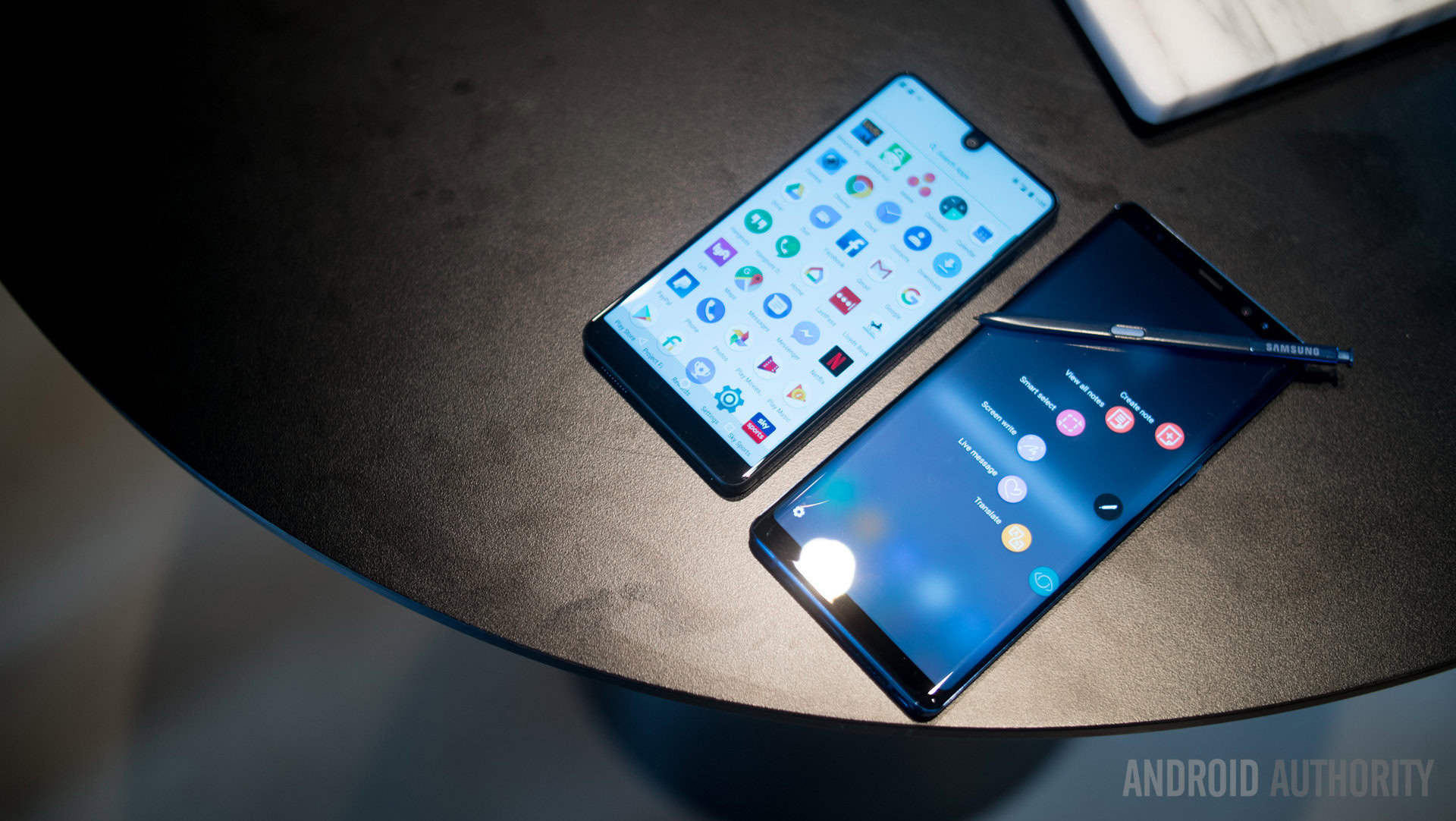
In terms of software, there are two very different takes at work here
But what is undeniably essential is a good software user experience, and there are two very different takes on that philosophy at work here. Samsung continues to refine and streamline its software as much as it can, and this continues in the Note 8. Aside from new S Pen features, the main addition comes to multitasking, as the new App Pair shortcut allows you to automatically open up two applications into Multi-Window with the tap of a button. This will be great for multitaskers.
The Essential Phone is basically Android at its purest, with very few applications added on top of what is already included in the stock build. That means there isn’t too much to actually talk about here aside from Android stretching out to accommodate the great screen. The Essential Phone offers a speedy, smooth, and reliable experience, except of course for the camera.
It's still early, but Essential still has work do to on its camera
Before we get to the big story (Samsung going the dual-camera route), we see Essential make good on its promise to bring dual lenses to its first phone. The combo of RGB and monochrome sensors is one that we’ve seen before in other phones, but we’re hoping Essential can hold its own against the stiff competition. However, Essential is clearly still working on the camera. We’ve received two OTA updates since receiving our review unit, and since then we’ve found monochrome photos to be quite enjoyable due to their high detail. We will continue testing the camera quality but we wouldn’t be surprised if more updates came before shipping time.
So far, we’ve been disappointed about the instability of the camera app. On quite a few occasions the camera app would crash and then fail to open up, but even when it’s working, the app is a bit slow when changing modes and can take way longer to shoot than it should. It also lacks extra modes like a manual mode, which keeps everything auto but lacking in customization.
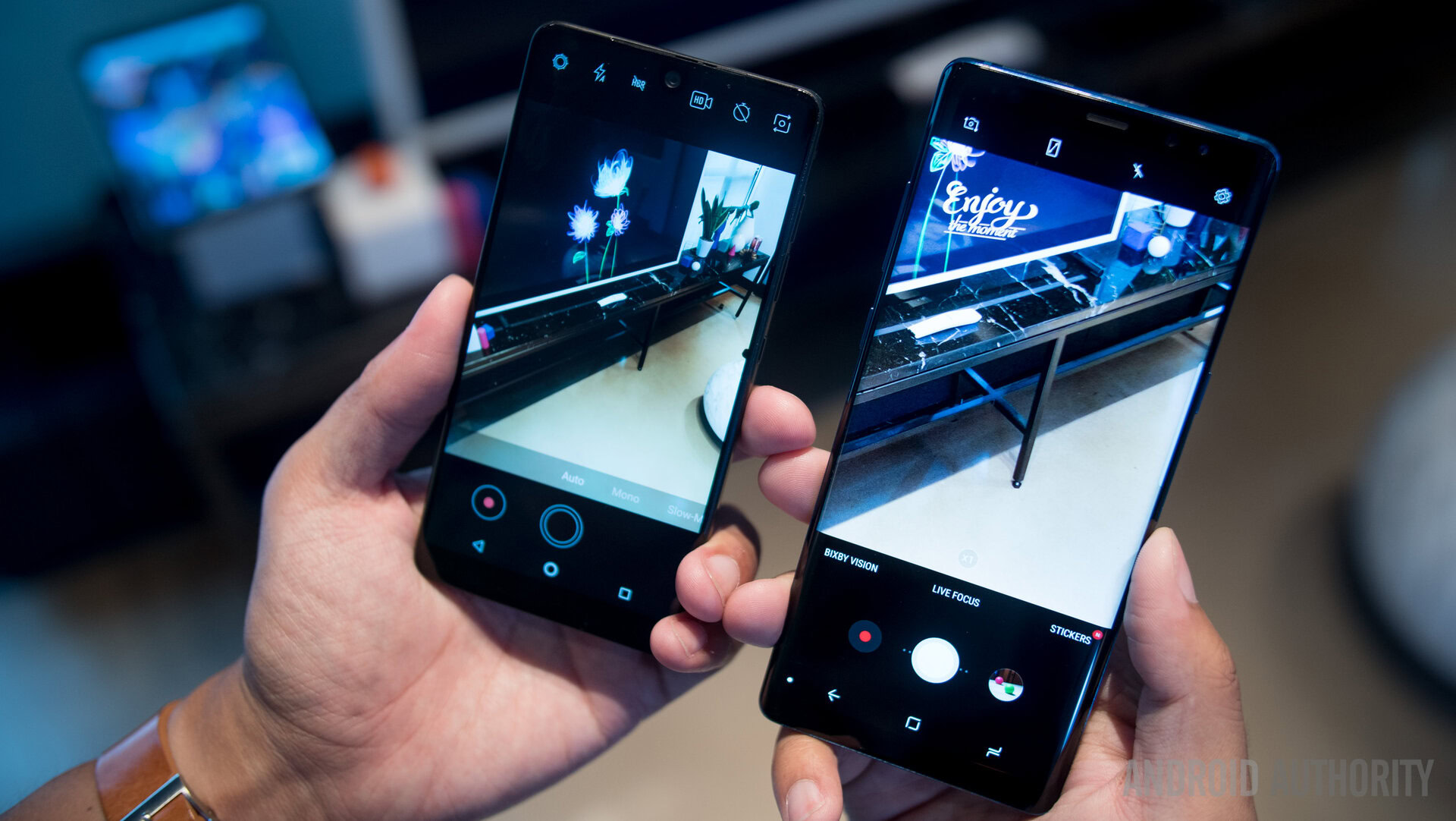
Samsung finally finds itself among the rest of the dual cameras in the Android space
Samsung is no stranger when it comes to including a ton of modes in their cameras, but there’s one big addition this time around: a 12 MP 2x optical zoom lens that compliments the 12 MP main sensor. Together, they bring a Live Focus feature for depth of field shooting, which is great for taking portrait shots. What we really like about this mode is the fact that you can change the depth of field after the picture is taken. Otherwise, the camera utilizes the zoom up to 10x digitally and can be smoothly altered by sliding the shutter button up and down like on a camcorder.
In terms of pricing, the Essential Phone is up for pre-order now for $699 either unlocked or via Sprint, while the Galaxy Note 8 will go up for pre-order on August 24 with shipments starting September 15.
There are two fundamentally different philosophies at play here
There are two fundamentally different philosophies at play here. Samsung is still continuing to provide a feature-packed yet reliable experience, while the Essential Phone is trying to give users the best possible experience with what they deem truly essential. Whichever one you end up choosing, however, you’ll be getting one of the most unique-looking phones of 2017.